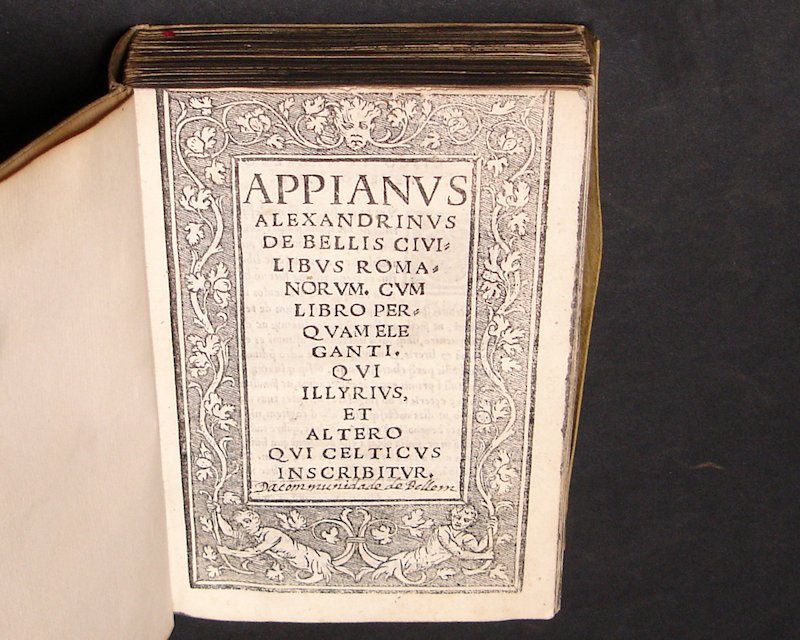APPIANUS.
Appianus Alexandrinus De bellis civilibus Romanorum. Cum libro perquam eleganti, qui Illyrius, et altero qui Celticus inscribitur. (Translated from the Greek into Latin by Petrus Candidus)
(Venice), n.d. (Colophon at the end: Venetiis opera magistri Bernardini de Vitalibus, 1526, die quarto mensis Madii)
8vo. 372 unnumbered leaves. Modern overlapping vellum 14.5 cm (
Ref: Hoffmann I,216; EDIT16: CNCE 2197; Graesse 1,169; cf. Ebert 849) (
Details: Title within woodcut floral borders; short title on the back; good white paper. Latin translation only) (
Condition: Good condition; old and small ownership entry on the title) (
Note: Appianus, 2nd century AD, originating from Alexandria, gained Roman citizenship, and went to Rome. There he was a lawyer, and wrote his 'Roman History' in Greek (Rhômaïka). It treated the Roman conquests arranged ethnographically in 24 books. 'Loyal and honest, an admirer of Roman imperialism, he wrote in the plain
koinê, and though interested mainly in wars and unreliable about Republican institutions and conditions, preserves much valuable material'. (OCD 2nd ed. p. 87) The Greek text was first published in 1551 in Paris, by Carolus Stephanus. The first publication of any of the works of Appian however was the Latin translation by Pier Candido Decembrio, (in latin Petrus Candidus) dating from 1472. It was apparantly a success, because it was repeated in 1477, 1492, 1494, 1495. 1499. 1500 and 1526. The Latin translation deals with the part on the Civil Wars (5 books), and offers also a 'liber illyricus', 'liber celticus', 'liber lybicus', 'liber syrius', 'liber parthicus', & 'liber mithridaticus'. This translation of 1526 is a reissue of the edition of 1500, also published in Venice. The translation of Candidus is not without value. Graesse 1,169: 'Cette version (Candidus' translation of 1472) est très importante pour la critique du texte, le traducteur s'étant servi d'un manuscrit assez correct et l'ayant traduit presque littéralement'. Ebert criticizes its style, he calls the translation obscure and bombastic, but he also underlines its critical value. (Ebert 849) Pier Candido Decembrio, born in 1399 in Pavia, was a well-known Italian Renaissance humanist, prolific author, and classical scholar. He was secretary to Filippo Maria Visconti, Duke of Milan for thirty years, from 1450 'magister brevium' to Pope Nicholas V, and later to Pius II. The translation of Appianus was commissioned by Pope Nicholas V, after Candido's arrival in 1450 in Rome. Candidus, who had been a pupil of the Greek refugee Manuel Chrysoloars, is best known for his translation of the Republic of Plato, which he completed in 1440. He died in Milan in 1477) (Dizionario Biografico degli Italiani - Volume 33 (1987)) (
Provenance: In ink on the title 'Da commudidade de Bellem', an ownership entry of the Jerónimos Monastery, or Royal Monastery of Santa Maria de Belém in Lisbon, founded in 1501. The monastery has been dissolved in 1833. Its building is now an important architectural monument. On the internet we found only 2 books with this entry/provenance, in Portuguese libraries) (
Collation: a-z8, &8, ?8, R8, A-C8, aa-rr8, 2s4) (Photographs on request)
Book number: 120002 Euro 625.00
Keywords: (Oude Druk), (Rare Books), Appian, Appianus, Bellum Civile, Greek literature, Griechische Literatur, Latin translation only, Roman history, antike altertum antiquity, römische Geschichte
 APPIANUS.
APPIANUS.

